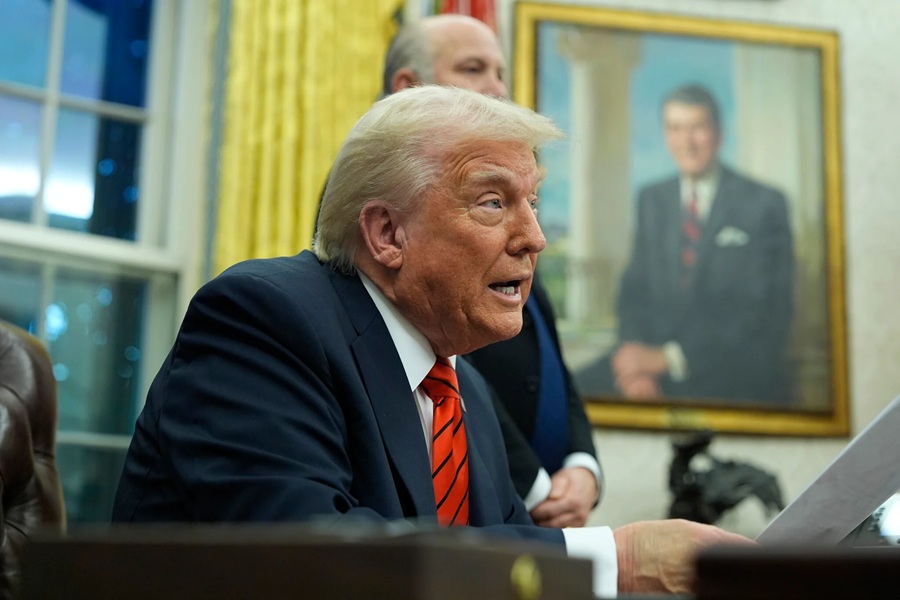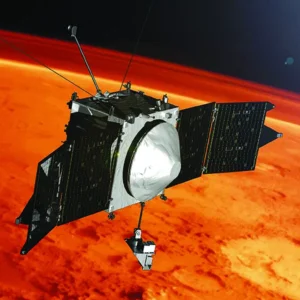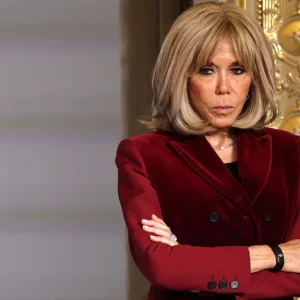LONDON – The U.S. is close to resuming intelligence sharing with Ukraine as both nations prepare for high-stakes peace talks in Saudi Arabia, President Donald Trump confirmed Sunday. The potential shift in policy comes as Washington looks to pressure Kyiv into negotiations that could bring an end to Russia’s ongoing invasion.
“Well, we just about have,” Trump told reporters aboard Air Force One when asked about lifting the freeze on intelligence sharing. “We want to do anything we can to get Ukraine serious about getting something done.”
For now, intelligence sharing remains limited. A U.S. official told media that the U.S. is still withholding intelligence for offensive operations but continues to provide defensive support.
A Changing U.S. Stance on Ukraine
The Trump administration’s approach to Ukraine has diverged sharply from the unwavering support seen during Joe Biden’s presidency. Since taking office, Trump has accused Ukraine of starting the war, questioned President Volodymyr Zelenskyy’s legitimacy, and suspended military aid while attempting to push Kyiv into a controversial minerals-sharing deal.
His administration has also frozen intelligence support, a move widely seen as an attempt to force Ukraine into making concessions to Russia.
Now, as tensions between Washington and Kyiv reach a boiling point, the upcoming Saudi talks could determine the future of U.S.-Ukraine relations.
The Jeddah Peace Talks
Tuesday’s talks in Jeddah aim to reset relations between the two nations after weeks of growing friction. The U.S. delegation will include Secretary of State Marco Rubio and National Security Adviser Mike Waltz, while Ukraine will be represented by Andriy Yermak, head of Zelenskyy’s presidential office.
According to Trump, the U.S. is looking for signs that Ukraine is ready to negotiate. “We have big meetings coming up. As you know, it’s Saudi Arabia—that’s going to include Russia, it’ll be Ukraine. We’ll see if we can get something done,” Trump said.
He also suggested Ukraine is not yet demonstrating a willingness to make peace. “I think they will sign the minerals deal. I want them to want peace.”
Hamas Rejects Trump’s Ultimatum, Insists on Ceasefire for Hostage Release

Ukraine’s Response
President Zelenskyy is set to meet with Saudi Crown Prince Mohammed bin Salman ahead of the talks. “Tomorrow, we will continue working to bring peace closer—there will be my visit to Saudi Arabia,” he wrote on social media Sunday.
A source close to Zelenskyy confirmed that Ukraine plans to propose a partial ceasefire during talks with the U.S. The proposed truce would apply to long-range air strikes and naval attacks, though details remain unclear.
“We want to propose a partial ceasefire that can be monitored and then see how the Russians respond to determine the next steps,” the source said.
Rubio: Ukraine Must Show Willingness to End War
Speaking ahead of the meetings, Secretary of State Marco Rubio suggested Ukraine’s ceasefire proposal could be a step in the right direction.
“I’m not saying that alone is enough, but it’s the kind of concession you would need to see in order to end this conflict,” Rubio said.
However, he downplayed the significance of the minerals deal, despite Trump’s repeated emphasis on it. “It’s certainly a deal the president wants to see done, but it doesn’t necessarily have to happen tomorrow. There’s still more details to work out.”
Europe Watches Closely as Russia Reacts
The growing rift between the U.S. and Ukraine has sparked concerns among European leaders, who fear Trump’s approach could weaken Western unity against Russia. Meanwhile, Moscow appears to be welcoming the shift in U.S. policy.
Kremlin spokesperson Dmitry Peskov called the U.S.-Ukraine talks in Saudi Arabia a “positive” step but suggested that deeper issues remain unresolved.
“We have repeatedly heard statements that the U.S. expects the Ukrainians to demonstrate their desire for peace. That’s probably what everybody is waiting for,” Peskov said.
With the Saudi talks approaching, the key question remains: Will Ukraine be willing to compromise, and will the U.S. ease its pressure—or is this just the next phase in an increasingly strained alliance?






